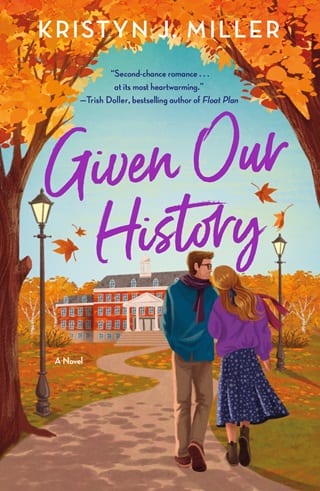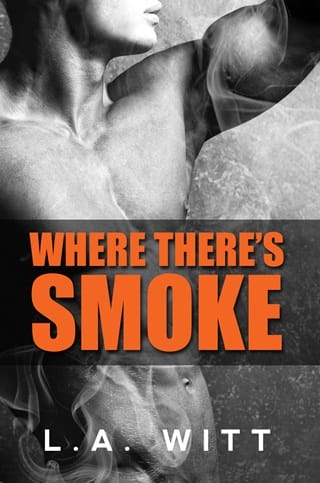Chapter 29
CHAPTER
29
SIX YEARS AGO
I spent the remainder of my time in Manchester in a sort of trance: eyes strained from reading and writing, skimming and editing; my neck and shoulders aching from hours spent hunched over the computer; my feelings bottled up, talking to few acquaintances and fewer friends. In the midst of all of it, like a true masochist, I stuck to my plan. That March, I accepted an offer of enrollment from the History Department at University of Notre Dame, and by the end of the spring semester, I was packing my bags to move to another unfamiliar city.
For the first six months after that phone call on Christmas Eve, I tried to reach out to Teddy. I’d call, he’d send me to voice mail. I sent long-winded texts apologizing for what I’d said, emphasizing how much our friendship mattered to me. I sent short, nonsensical texts wishing him a Happy Presidents’ Day or complaining about my professors. All went unanswered. When I tried to call him on my birthday and it went directly to voice mail, I assumed he’d blocked me and accepted my fate.
For the next couple years, I stalked his Facebook periodically, where he’d conveniently forgotten to block me (and I wasn’t about to call attention to that by trying to message him). But my curiosity was never really satisfied. He was pretty inactive, save the rare occasions when he shared an article, usually without comment. So I clung to the little details, like when he changed his current city from Allentown to Dormont, or the day our mutual friends jumped from seven to eight. Miranda Schooner, of all people. It struck me as odd, and I dwelled on it for a few days, but they had met in passing a couple times, and I was just as soon distracted by my research.
I was a couple years into the program and finished with the required coursework when I decided to apply for a part-time job teaching freshman-level courses for an online college. It had seemed like the easiest option, at the time, but the application called for three letters of recommendation, preferably from different institutions. My thesis advisor was happy to comply. A quick email to one of my professors in Manchester garnered a reply that just said letter, as requested, with a glowing review attached. But my capstone advisor at UMD had to go and make things difficult.
I’d feel more comfortable recommending you if we had a chance to talk first, she said. That way you could update me on what you’ve been up to in the interim, your research, etc.
Professor Blanchett had retired a few years ago and plainly had too much time on her hands. I tried to suggest a video call, but she wouldn’t hear of it, so I reluctantly agreed to meet up for lunch as soon as I was back in Maryland for summer break; thankfully, the deadline for the application wasn’t until the end of July. We arranged to meet at a sandwich shop near Hampden.
On an afternoon in mid-June, I parked outside a Harris Teeter and marched three blocks with a messenger bag full of notes and papers slung over my shoulder, ready to make my case.
I never did get that recommendation. I suppose fleeing the restaurant mid-lunch because your former best friend turned up with his girlfriend makes you look flighty and unprofessional —at least according to Professor Blanchett’s strongly worded follow-up email. I ended up sitting in my Volvo in the parking lot of the supermarket with my seat belt buckled, sobs racking my body. It was like everything I’d bottled up for the past three years was pouring out all at once. I’d lost my best friend, but I guess I didn’t really feel the full weight of that loss until that day.
My hands were on the steering wheel at ten and two, but my vision was so blurry that there was no way I could drive. I needed to calm down. I needed to do something. I reached over to the passenger seat and grabbed my phone out of the messenger bag, blinking tears out of my eyes as I scrolled down my recent messages. I found my mom and pressed call. It rang twice and went to voice mail, so I called the house instead.
Dad answered on the first ring.
“Hey,” I said, trying to keep my voice steady. “Mom’s not answering her phone. Is she at home?”
“She’s at work right now,” he said. Then, after a beat: “Is everything okay?”
“Yeah, it’s fine, it’s just—” I took a shuddering breath and exhaled, calming down a little now that I was hearing a familiar voice. Now that someone was hearing me have a total breakdown. “Could I just… vent to you for a minute?” I didn’t expect him to say much of anything back, to impart any sage wisdom or anything. This was my dad we were talking about.
“Of course,” he said, sounding concerned.
So I did. I told him everything—well, almost everything—that had happened between me and Teddy: how we’d bonded over burned CDs and used history books, how we realized on an afternoon at Federal Hill Park that we might like each other as more than friends. How it all came crashing down over a phone call on Christmas Eve, and how I realized today that he’d never forgive me. That we’d never forgive each other. It actually felt good to talk to my dad for once, even though I was pretty sure he wouldn’t know what to say by the time I was finished.
“That’s a shame,” he said slowly, after I’d recounted the incident in the sandwich shop. “He seemed like an all right kid. And you both like history, so that’s—” I choked on a fresh sob, and he must’ve realized that even this lukewarm praise for Teddy wasn’t helping, because he cleared his throat and switched tactics. “But you know what they say. ‘It’s better to have loved and lost than to never have loved at all,’ and all that.”
I shut my eyes, trying to stem the flow of the tears. “Please, Dad, I’m not in the mood for more idioms.”
He chuckled uncertainly. “Don’t know why you’re saying ‘more,’ but I’m pretty sure that’s not an idiom, Clare Bear. It’s Shakespeare.”
I was almost certain that wasn’t right either. But I didn’t have Teddy here to laugh with, to point out that my dad had attributed the quote to the wrong person, that that was actually what George Washington had said after he chopped down the cherry tree. I’d probably never get to share any of those inside jokes again.
It had been three years since our falling-out, but the wound felt fresh, opened anew. Somehow, this time, it was almost worse—because this time I got a glimpse of him moving on. The cruel irony was that it had taken me seeing him with someone else to realize how badly I wanted him for myself. Turning him away had resulted in the one thing that forced me to recognize the irrefutable truth, something that had become such a fundamental part of me that I didn’t even notice it: I was in love with my best friend.
And I’d broken his heart anyway.
I couldn’t possibly put all of that into words, not coherent ones, and my dad was waiting quietly on the other end of the phone. So I just said, “This really sucks.”
“Clara, listen to me,” Dad said. “I know it hurts right now, but you have to keep things in perspective. Everybody goes through rough patches. If you want to be together, then you’ll find a way to be together, sooner or later. Simple as that.”
“But it’s not that simple. Everything gets so complicated—I mean, look at you and Mom.”
“What about us?”
“I don’t know.” I sniffled. “You guys argue. Sometimes you don’t seem happy.”
“That’s not true,” he said, sounding a little offended. “Sure, we argue, but I couldn’t ask for a better partner than your mother.”
“But don’t you ever wonder if you were really meant to be together?” I asked. “If it was… fate, or something, or if the person you’re really meant to be with is still out there somewhere, and it would’ve all been so easy with them, but instead you’re with the wrong person, you took the hard road—”
“Clara,” he interrupted, more serious than I’d ever heard him, “love is the hard road. The person you’re meant to be with is whoever you choose to be with. And you’ll have to fight for it and make sacrifices for it every step of the way. You just have to choose someone who’s worth all that trouble, and then you have to keep on choosing them, every day.”
 Fullepub
Fullepub 



